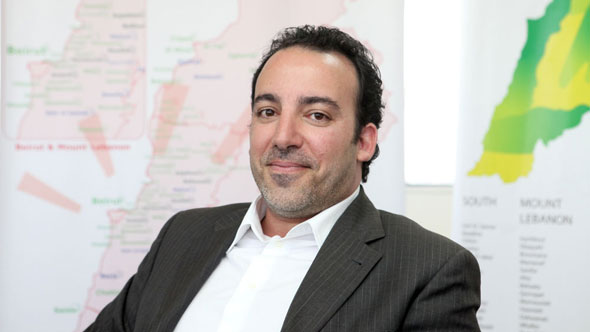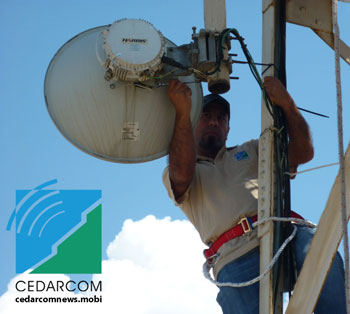Internet in Lebanon: Private Sector, Licensing, Development
Lebanon is unique when it comes to the internet. It was one of the first countries in the region to have internet back in 1992. Lebanon internet market picked up at a very fast rate and then the growth levelled off. Recently, internet in Lebanon is back on the tracks mostly driven by initiatives from the Ministry of Telecom of Lebanon. There is much more we can still do, says Cedarcom.
Interview with Imad Tarabay, Chairman and CEO of Cedarcom

We all know internet is a major challenge for future development in Lebanon. How is Lebanon different in terms of how internet regulations are structured? What’s the penetration rates and broadband? How come it is not working well?
Lebanon is pretty much unique when it comes to the internet. We were one of the first countries in the region to have internet back in 1992. We picked up at a very fast rate, and then things ended up stalling. Not until recently, things started to develop better, mostly driven by initiatives from the Ministry of Telecom in Lebanon. The most important thing that happened last year was the reduction of tariffs on the international gateway. We used to pay 2000$ or 2700$ for a new one and suddenly dropped to 400 $ and the market exploded. Today, Lebanon enjoys 33 % market share. Yet, the potential can go into a 40, 50 and 60 % market share is possible. We are much better in terms of cultural diversity and language than Kuwait, Bahrain or Saudi Arabia. Bahrain, for example, has over 60 % penetration rate. There is much more we can still do.
From the peculiarity of this market, the major functions are still controlled by the government. For example, the international gateway, which is a very vital function for the internet, is still controlled by the government. There is no private sector investment in that front. That makes price fixation a problem. If you want to open the market more, you have to liberalize price fixing because you end up taxing the consumer indirectly.  I think this is something the Minister will be implementing. But, I think there are stages for this opening of the market. The second reason, the second most lucrative income to the government is the telecom. Number one is taxes, second the telecom and third the import taxes. Of other peculiarities, the mobile sector is still owned by the government. You have different schools, some you should privatize it, others advise to corporatize it. I am totally against privatizing it at the moment because it ends up in the pockets of wealthy people. What we are advocating is to corporatize and list in Beirut stock exchange. You will have dynamics and the wealth of the profits generated by these companies will go to the pockets of Lebanese people. So GDP will go up and spending will go up too. And then the economy circle continues.
I think this is something the Minister will be implementing. But, I think there are stages for this opening of the market. The second reason, the second most lucrative income to the government is the telecom. Number one is taxes, second the telecom and third the import taxes. Of other peculiarities, the mobile sector is still owned by the government. You have different schools, some you should privatize it, others advise to corporatize it. I am totally against privatizing it at the moment because it ends up in the pockets of wealthy people. What we are advocating is to corporatize and list in Beirut stock exchange. You will have dynamics and the wealth of the profits generated by these companies will go to the pockets of Lebanese people. So GDP will go up and spending will go up too. And then the economy circle continues.
What we have seen recently is the introduction of 3G. The speed is still not as high as it is supposed to be. We are talking of 1.2 megabytes per second. There is still much improvement to be done. But saying like it is been there for 7 months which is probably fair to say. It is late, but better then never, but it is going in that direction. On the DSL phone, a lot of things have to happen still. Again, it is related to the international transmission cost. The international fees are still at the 400$ and it is still expensive. There is a room for improvement by lowering the prices, mostly because the cost is around 35$ to 35$ per E1. We still buy at 420$ per E1. There is still more work to be done.
What have been done in terms of fiber optics?
On the international gate, the capacity of international cable has been increased fifteen times fold. Now, we are around 30 gigabytes per second. But, not all of this 30GBps has been distributed to the ISPs. The ministry of telecom has access to these 30 gigabytes. Probably, few gigabytes have been distrusted and more and more need to be distributed. There has been an investment in the field of fiber optics in this country. This is a very good initiative because the ministry forgot to do this over the past 7 years. Once this is available and coupled with more and more international capacity and recently they started commercializing a new fiber optics so as to have additional redundancy, then the infrastructure will be ready to make the market grow more. But this alone is not enough. You have to couple that with regulations and more initiatives for the private sector.
The private sector has problems. Our licensing remains one year and is only renewed on a yearly basis, so you can’t do much, you can’t invest much. If you have the capability to invest 20 or 30 million US dollars to put up a new network, your shareholders will be scared and the bank will not finance you, the vendors will not give you the vendor financing because all of them say: “Well you only have one year license. What if you can’t renew?”
Because without the private sector you can’t do much. With all that the ministry has done, which is commendable, Lebanon moved up from to the 160th in the world. Effectively the average speed was around 200kb per second and now it is 1.3 megabytes per second, this a great jump. We have to remember that other countries are also improving. We have improved the threefold, which is again, a great job, but again others are improving, for us to improve even further, we have to engage the private sector.
The private sector has problems. Our licensing remains one year and is only renewed on a yearly basis, so you can’t do much, you can’t invest much. If you have the capability to invest 20 or 30 million US dollars to put up a new network, your shareholders will be scared and the bank will not finance you, the vendors will not give you the vendor financing because all of them say: “Well you only have one year license. What if you can’t renew?” Well, we answer that we have been under this regime for the past 8 years and we going to keep getting renewed, because this is Lebanon. But you still need that paper that says “Expires in 2020”. Having that, facilitates a lot of things. I know that the ministry is working towards a policy and that is a great move. If we go back 4 years ago, the previous Minister Gibran Bassil was very much pro private sector and we are happy to know that the Minister Sehnaoui is heading in the same direction. We are now waiting for this document to see to know the details of it. Apparently, the Minister is heading in the same direction, promoting competition, especially fair competition. This is very important. Until now, there is no fair competition in the market. Up till now, the biggest operator is the Minister and the DSL for example is 200 000 subscribers to 400 000 subscribers. The ministry controls like 180 000 subscribers. That’s quite a major monopoly.
So you are one of the smallest competitors compared to the Minister, how do you play the market? How do you compete with the ministry and the big branches in the market?
On the wireless side, we have done very well. In the past years, we came to have the first position. We have a very strong brand and very good support and services. How do we compete? The only thing we can compete on is on the services and customer support. Now, the competition started to increase with 3G, because mobile competes with 3G. We are preparing an investment to update our network to be able to compete with 3G on a technical basis. But what remains, is still the unfair competition from the tax differentiation site. We pay direct and indirect taxes that are around 52 %, which include 20 % of our revenues going every month to the ministry as a license fee, whereas our competitors don’t have this taxation. I believe that the ministry is pro private sector and understands that the private sector will be there to offer new development, new services, new apps, etc. This gives us comfort that he is aware that he needs to remedy this unfair taxation, because if not the private sector will cease to exist. So, that idea gives us comfort that there will be continuity in the long term.
If you can’t compete on the technical aspects or on the product, and if pricing is essentially fixed, the only thing you can compete on is the customer service. This must be difficult. How do you persuade someone to adhere to your product? How do you do you persuade customers?
Look, some internet users are on their computers till 2 or 3 am, when you offer 24/7 service, there will be someone there to answer them and fix their problems. It’s not like a company that shuts down at 8 or 9pm. It makes a big difference to the customers. Do they have the capability to terminate the private sector if they want to? Yes. Because, there is a monopoly. The private sector doesn’t have the power or the control to impose regulations, because of the monopoly. However, given the sociopolitical dynamics of the sector, there will never be an initiative for the government to kill the private sector. Because then, at a certain point, things get tough and the people up rise and do their thing. The government will always keep this window open for the people to work, breathe, make a bit of profit, but not to kill them.
When you go to meet your clients, there is a couple of choice they can make. What is your frustration? Do they ask the same questions? Why should we go with your service? How do you respond to that?
On the corporate side, we don’t see a lot of competition with the government. We anticipate coming in when the fiber optic network will be ready.  But then again, to install a fiber optic link it takes months. So to really have the fiber, it’s going to take a long time. I am hoping that by that time, we will have the appropriate regulations to force open the networks for private service providers to use it, like what happened in other countries.
But then again, to install a fiber optic link it takes months. So to really have the fiber, it’s going to take a long time. I am hoping that by that time, we will have the appropriate regulations to force open the networks for private service providers to use it, like what happened in other countries.
What is your major frustration?
What needs to happen, and it will happen in the next few months, is the appointment of the board of telecom regulators and granting long term licenses for private operators. I think that if those happen, the highway for growth in this sector will start. Because, we will have the capability to invest and the regulator will protect all the operators fairly. A few months ago, I would have been pessimistic, but now things are moving in the good way.
What are the internal challenges?
Like in any company, there are internal challenges. Mostly her in Lebanon, we are facing the lack of technical resources, because an engineer in Lebanon gets paid 2000 $/month, where as in other Arab countries, they get paid 8000$/month. This is the biggest challenge: export of knowledge. This is something that my company faces, but that everybody else also faces.
Because you have a special advantage? How come?
What we have done 3 years ago, is that we put a strategy based on technical products and services. Obviously, if you execute properly, you achieve properly. Today, we rank number one in the sector. In the telecom business, it is not only about how good you are and how good are your services, it is also how do you select the right technology at the right time and how good you are at that, we are good at that and that’s we exceeded them. If you exceed, you get more subscribers, if you get more subscribers, you make more money and then you allocate properly that money to your people.
Do you offer specialized internet connections for companies that have different needs?
Sure, for example we differentiate ourselves in mobile VPN prob services, by which we offer VPN accounts with only VPN connections. For example, if you have a 100 employees, you want to offer them internet and to the intranet, wherever they are. Well, we offer such services. We were very innovative by offering certain things. For example, charging your subscription via SMS or seeing them online, it’s something many people have, but we are also charging them via connection managers. We have done hybrid accounts where if you are in an area where there is no connection, you can get access in different ways. We’ve really been innovative. We were one of the first companies to be on Facebook, back in 2006, when there were only 40 000 Lebanese Facebook users. Today, there is 1.4 million Facebook users in the country, that are registered. We’ve managed to stay in touch with our customers in different ways, via different vehicles. That served us well.
In terms of the profit driven from the customer service vis-a-vis the other business lines, which areas are the strongest?
We are stronger in retail, meaning 60% retail and 40 % corporate. It’s not a big difference. The corporate sector is growing a lot, especially now since the internet rates dropped. Some companies now want 8Mo connections, whereas in the past they had slower connections. With the price drop, they can get 4 times the connection for the same price. The demand will continue to grow once the E1 prices will drop further.
What is the vision for Cedarcom and the sector?
For Cedarcom, we have to reinvest in ourselves. We prepared for that and are ready to go as soon as we get clearance from the ministry. We will be putting in place a network that is very fast and very cost efficient. I mean the green side of it and you can put allot of input at the minimum investment. This means consumers will get certain accounts with a lot of speed, a lot of capacity at a similar price than the current accounts. However, we need certain clearance from the ministry. What we hope to see in the next year, and we are confident that we will see that, is a very clear cut policy from the ministry where it defines the view of moving forward and the role of the private sector in the growth. That should be transported into long term plans and translated into fair regulations for operators. If that happens, I can tell you that Lebanon will move from the 160th position to the top 20th position in a very small period of time. The reason is that, Lebanon is a small country and putting fiber optics for every building is feasible. Putting it in rural areas is also feasible. You are not talking about Russia or the US, where you have large territories. So having our country very well developed in terms of telecoms is very easy. We have the capabilities and the know-how, all we need is the empowerment: proper regulations and proper licensing. I think these two things will happen very soon.